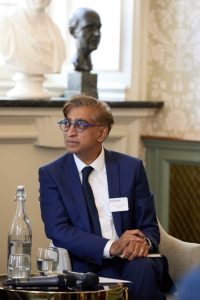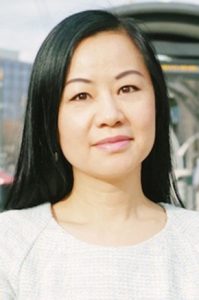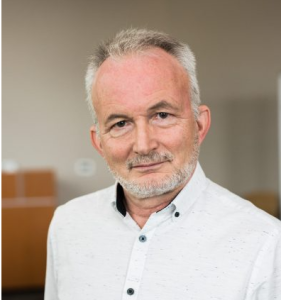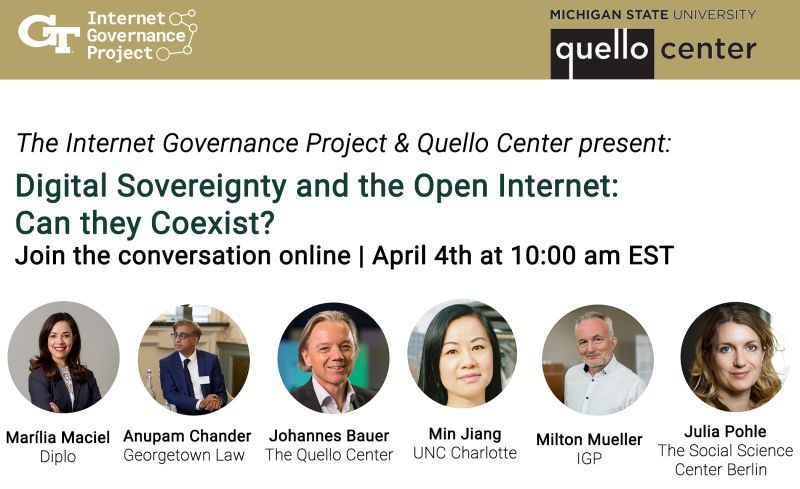Via Zoom
RSVP Here | or email quello@msu.edu
An Internet Governance Project (IGP)/Quello Center joint event.
On April 4, 2025, the Internet Governance Project (IGP) in collaboration with the Quello Center will gather scholars of differing views to debate what digital sovereignty means, how it is being used as a label, and whether the various interpretations of the term are compatible with the foundational values of the open internet.
Recently, new books and analyses have been published, including the book edited by Min Jiang and Luca Belli, Digital sovereignty in the BRICS countries (Cambridge, 2025), the volume by Johannes Thumfart, The liberal internet in the postliberal era (Springer, 2024), and a special issue of Policy & Internet on the topic, edited by Julia Pohle, Mauro Santantiello, and Riccardo Nanni.
IGP and the Quello Center welcome the renewed interest in digital sovereignty and vowed to engage in a rigorous discussion of the concept and the arguments. This webinar will be moderated by Johannes Bauer, the Quello Chair of Media and Information Policy, and will feature (alphabetically):
- Anupam Chander, legal expert on global regulation of new technologies.
- Julia Pohle, co-director of research group Politics of Digitalisation at the WZB Berlin Social Science Center.
- Marília Maciel, Director of Digital Trade and Economic Security at DiploFoundation.
- Milton Mueller, Director of the Internet Governance Project (IGP) at Georgia Tech.
- Min Jiang, Professor of Communication Studies at UNC Charlotte.
Join us on April 4, 2025, from 10:00 – 11:00 am EDT for what is sure to be a riveting discussion! Use the link here to register for the Zoom webinar: https://bit.ly/4gXZY6b
The Panel:
Anupam Chander
 Professor Chander is an expert on the global regulation of new technologies. A graduate of Harvard College and Yale Law School, he clerked for Chief Judge Jon O. Newman of the Second Circuit Court of Appeals and Judge William A. Norris of the Ninth Circuit Court of Appeals. He practiced law in New York and Hong Kong with Cleary, Gottlieb, Steen & Hamilton. He has been a visiting law professor at Yale, the University of Chicago, Stanford, Cornell, and Tsinghua. He previously served as the Director of the California International Law Center and Martin Luther King, Jr. Professor of Law at UC Davis. A member of the American Law Institute, he has also served on the Executive Council of the American Society of International Law, where he co-founded the International Law and Technology Interest Group. The author of The Electronic Silk Road (Yale University Press), he serves as a judge of the Stanford Junior International Faculty Forum. A recipient of Google Research Awards and an Andrew Mellon grant on the topic of surveillance, he has served on ICTSD/World Economic Forum expert groups on the digital economy. He serves as an Adjunct Senior Research Scholar at Columbia University’s School of International and Public Policy, a faculty advisor to Georgetown’s Institute for Technology Law and Policy, and as a faculty affiliate of Yale’s Information Society Project.
Professor Chander is an expert on the global regulation of new technologies. A graduate of Harvard College and Yale Law School, he clerked for Chief Judge Jon O. Newman of the Second Circuit Court of Appeals and Judge William A. Norris of the Ninth Circuit Court of Appeals. He practiced law in New York and Hong Kong with Cleary, Gottlieb, Steen & Hamilton. He has been a visiting law professor at Yale, the University of Chicago, Stanford, Cornell, and Tsinghua. He previously served as the Director of the California International Law Center and Martin Luther King, Jr. Professor of Law at UC Davis. A member of the American Law Institute, he has also served on the Executive Council of the American Society of International Law, where he co-founded the International Law and Technology Interest Group. The author of The Electronic Silk Road (Yale University Press), he serves as a judge of the Stanford Junior International Faculty Forum. A recipient of Google Research Awards and an Andrew Mellon grant on the topic of surveillance, he has served on ICTSD/World Economic Forum expert groups on the digital economy. He serves as an Adjunct Senior Research Scholar at Columbia University’s School of International and Public Policy, a faculty advisor to Georgetown’s Institute for Technology Law and Policy, and as a faculty affiliate of Yale’s Information Society Project.
Min Jiang
 Dr. Min Jiang is Professor of Communication Studies, an affiliate faculty member of International Studies at UNC Charlotte, and CyberBRICS Visiting Professor at FGV Law School (Rio de Janeiro, Brazil). She is also a Secretariat member of the annual international Chinese Internet Research Conference (CIRC) as well as an Executive Steering Committee member and China director of the Global Media & Internet Concentration Project (GMCIP), a $2.5 million CAD grant to investigate media ownership and concentration issues in 30+ countries. Her work lies at the intersections of digital technology, geopolitics and policy with a focus on China and the Global South (especially BRICS countries). She has co-edited three journal special issues and published over 40 journal articles, book chapters, research reports and book reviews. A book she co-edited “Digital Sovereignty in the BRICS Countries” was published in 2025 by Cambridge University Press. She received her Ph.D. in Communication from Purdue University in 2007.
Dr. Min Jiang is Professor of Communication Studies, an affiliate faculty member of International Studies at UNC Charlotte, and CyberBRICS Visiting Professor at FGV Law School (Rio de Janeiro, Brazil). She is also a Secretariat member of the annual international Chinese Internet Research Conference (CIRC) as well as an Executive Steering Committee member and China director of the Global Media & Internet Concentration Project (GMCIP), a $2.5 million CAD grant to investigate media ownership and concentration issues in 30+ countries. Her work lies at the intersections of digital technology, geopolitics and policy with a focus on China and the Global South (especially BRICS countries). She has co-edited three journal special issues and published over 40 journal articles, book chapters, research reports and book reviews. A book she co-edited “Digital Sovereignty in the BRICS Countries” was published in 2025 by Cambridge University Press. She received her Ph.D. in Communication from Purdue University in 2007.
Marília Maciel
 Dr. Marília Maciel is Director of Digital Trade and Economic Security at DiploFoundation, leading the organisation’s research and capacity development in these areas. She is also involved in projects related to the economic impact of artificial intelligence, trade and AI, and Internet governance. She has served in international bodies and organizations, such as the Global Commission on the Stability of Cyberspace (GCSC), and the Internet Corporation for Assigned Names and Numbers (ICANN). Prior to joining Diplo, Ms. Maciel was a researcher and coordinator of the Center for Technology and Society of the Getulio Vargas Foundation (CTS/FGV) in Rio de Janeiro. She holds a PhD from the University of Bordeaux Montaigne, and her thesis focused on the securitization of information and communication technologies and services in the context of Sino-American relations.
Dr. Marília Maciel is Director of Digital Trade and Economic Security at DiploFoundation, leading the organisation’s research and capacity development in these areas. She is also involved in projects related to the economic impact of artificial intelligence, trade and AI, and Internet governance. She has served in international bodies and organizations, such as the Global Commission on the Stability of Cyberspace (GCSC), and the Internet Corporation for Assigned Names and Numbers (ICANN). Prior to joining Diplo, Ms. Maciel was a researcher and coordinator of the Center for Technology and Society of the Getulio Vargas Foundation (CTS/FGV) in Rio de Janeiro. She holds a PhD from the University of Bordeaux Montaigne, and her thesis focused on the securitization of information and communication technologies and services in the context of Sino-American relations.
Milton Mueller
 Milton Mueller is an internationally prominent scholar specializing in the political economy of information and communication. The author of seven books and scores of journal articles, his work informs not only public policy but also science and technology studies, law, economics, communications, and international studies. His books Will the Internet Fragment? (Polity, 2017), Networks and States: The global politics of Internet governance (MIT Press, 2010) and Ruling the Root: Internet Governance and the Taming of Cyberspace (MIT Press, 2002) are acclaimed scholarly accounts of the global governance regime emerging around the Internet. Mueller’s research employs the theoretical tools of institutional economics, STS and political economy, as well as historical, qualitative and quantitative methods.
Milton Mueller is an internationally prominent scholar specializing in the political economy of information and communication. The author of seven books and scores of journal articles, his work informs not only public policy but also science and technology studies, law, economics, communications, and international studies. His books Will the Internet Fragment? (Polity, 2017), Networks and States: The global politics of Internet governance (MIT Press, 2010) and Ruling the Root: Internet Governance and the Taming of Cyberspace (MIT Press, 2002) are acclaimed scholarly accounts of the global governance regime emerging around the Internet. Mueller’s research employs the theoretical tools of institutional economics, STS and political economy, as well as historical, qualitative and quantitative methods.
Dr. Mueller’s prominence in scholarship is matched by his prominence in policy practice. He is the co-founder and director of the Internet Governance Project (IGP), a policy analysis center for global Internet governance. Since its founding in 2004, IGP has played a prominent role in shaping global Internet policies and institutions such as ICANN and the Internet Governance Forum. He has participated in proceedings and policy development activities of ICANN, the International Telecommunications Union (ITU), the National Telecommunications and Information Administration (NTIA) and regulatory proceedings in the European Commission, China, Hong Kong and New Zealand. He has served as an expert witness in prominent legal cases related to domain names and telecommunication policy. He was elected to the Advisory Committee of the American Registry for Internet Numbers (ARIN) from 2013-2016, and appointed in 2014 to the IANA Stewardship Coordination Group. Dr. Mueller has also been a practical institution-builder in the scholarly world, where he led the creation of the Global Internet Governance Academic Network (GigaNet), an international association of scholars.
Julia Pohle
 Dr. Julia Pohle co-directs the research group Politics of Digitalisation at the WZB Berlin Social Science Center. She is a Senior Associate Researcher at the Center for Digitalisation, Democracy and Innovation at the Brussels School of Governance and at the CNRS Center for Internet and Society in Paris. Her research and publications focus on global and national digital governance, digital sovereignty, digital geopolitics and the history of global communication policy. Julia holds a PhD in Communication Studies from Vrije Universiteit Brussel and an MA in Cultural Studies, Philosophy and Computer Science from Humboldt-Universität zu Berlin. Among other academic roles, Julia is currently co-chair of the Communication Policy &Technology Section of the International Association for Media and Communication Research (IAMCR) and an academic editor of the Internet Policy Review (IPR). For the German Federal Ministry of Digitalisation and Transport, she is currently leading a task force to develop future scenarios for internet governance in the coming decade.
Dr. Julia Pohle co-directs the research group Politics of Digitalisation at the WZB Berlin Social Science Center. She is a Senior Associate Researcher at the Center for Digitalisation, Democracy and Innovation at the Brussels School of Governance and at the CNRS Center for Internet and Society in Paris. Her research and publications focus on global and national digital governance, digital sovereignty, digital geopolitics and the history of global communication policy. Julia holds a PhD in Communication Studies from Vrije Universiteit Brussel and an MA in Cultural Studies, Philosophy and Computer Science from Humboldt-Universität zu Berlin. Among other academic roles, Julia is currently co-chair of the Communication Policy &Technology Section of the International Association for Media and Communication Research (IAMCR) and an academic editor of the Internet Policy Review (IPR). For the German Federal Ministry of Digitalisation and Transport, she is currently leading a task force to develop future scenarios for internet governance in the coming decade.
Our Moderator:
Johannes M. Bauer
 Johannes M. Bauer is a researcher, writer, teacher, and academic entrepreneur. He is interested in the digital economy next-generation media. His position as Quello Chair for Media and Information Policy facilitates the pursuit of rigorous and actionable research. From September 2023 through December 2024, he was on leave from MSU to serve as the Chief Economist in the Office of Economics and Analytics (OEA) of the U.S. Federal Communications Commission in Washington, DC.
Johannes M. Bauer is a researcher, writer, teacher, and academic entrepreneur. He is interested in the digital economy next-generation media. His position as Quello Chair for Media and Information Policy facilitates the pursuit of rigorous and actionable research. From September 2023 through December 2024, he was on leave from MSU to serve as the Chief Economist in the Office of Economics and Analytics (OEA) of the U.S. Federal Communications Commission in Washington, DC.
Educated as an engineer and social scientist, he obtained advanced degrees in economics from the Vienna University of Economics and Business, Austria. Michigan State University has been his home institution since 1990. He had the privilege to spend extended times affiliated with Delft University of Technology, The Netherlands (2000-2001), the University of Constance, Germany (Summer 2010), and the University of Zurich, Switzerland (2012).
Appropriately designed, governed, and used, advanced information and communication technologies (ICTs) create tremendous opportunities and benefits. They enable individuals to realize their capabilities, support sustainable communities, and support inclusive and livable societies. Harnessing these potential benefits will require public interest technology, good governance models, as well as competition and cooperation. Dr. Bauer’s research on these topics has greatly benefited from collaboration with students and practitioners in Michigan, across the United States and abroad.


